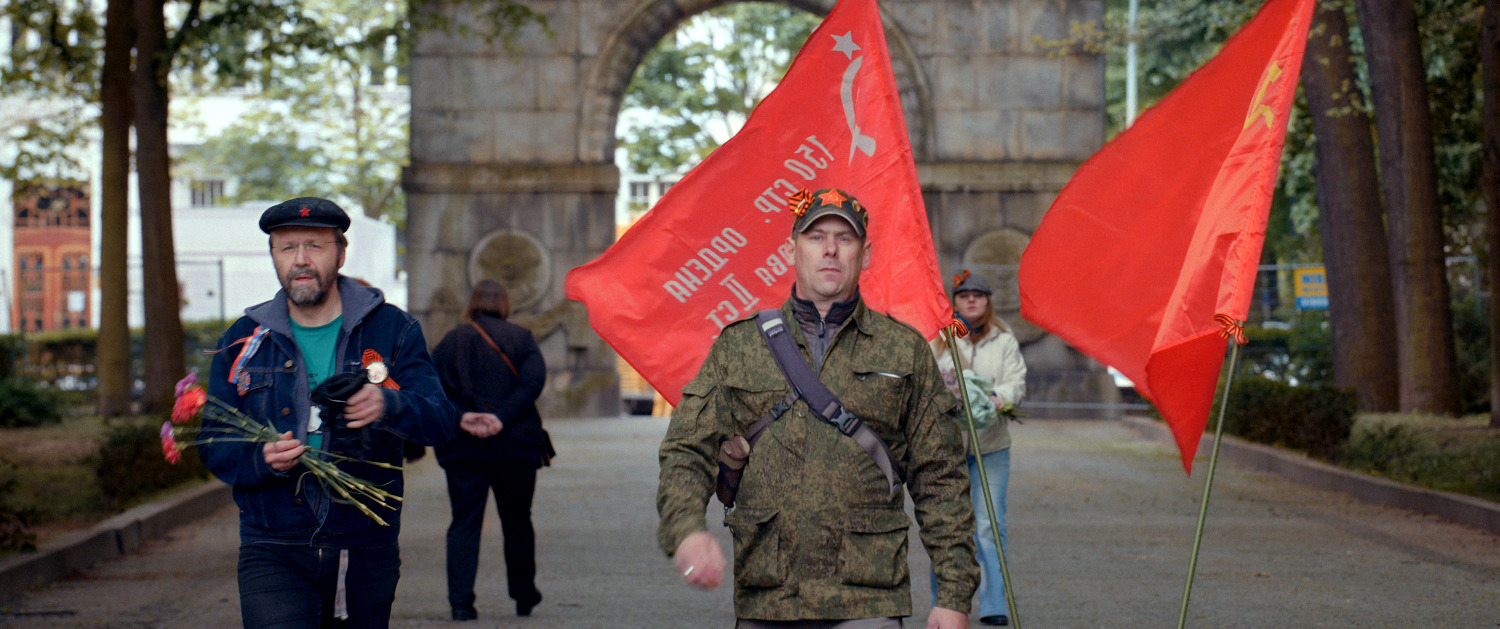Victory Day
(Germany/Lithuania, 94 min.)
Dir. Sergei Loznitsa
In hindsight, from the fragmented present, the history of the 20th century looks downright dualistic. There was Democracy and Authoritarianism, Capitalism and Communism, Colonizer and Colonized, East and West—all still more-or-less coherent concepts, all with clear moral stakes. Who in their right mind would not be on the side of civil rights, Mandela, Allende, Gandhi?
In fact, things were never that straightforward. In Europe, especially, that history has been increasingly contested since the fall of the Soviet Union. As much as we might naively hope that the horrors of the 20th century will forever speak for themselves in absolute terms, the past few decades have shown that they do not, and probably never did. “Never again,” the world said after Auschwitz, only to stand idly by as genocide after genocide was perpetrated around the world, including, recently, by such former freedom fighters as Aung San Suu Kyi. Neo-Nazis and their fellow travelers are culturally—and sometimes politically—ascendant in various places, under diverse guises. In the former USSR, dissidents fought for decades to end that system, only to be subjected to oligarchy, inflation, poverty and the realization that they lacked a shared programme beyond ending the obviously corrupt Soviet system. Today, apparently, most people in eastern Europe do not think their lives improved after the fall of communism. It’s a turn of events that would have been unthinkable in a time when the tectonics of great forces allowed some degree of moral certainty.
Sergei Loznitsa is the filmmaker most attuned to these forces, these ambivalences. For almost two decades, he has been uniquely obsessed with the history of the Soviet Union and its successor states in central and eastern Europe. His documentary work over that period has fallen into two broad categories: films constructed from archival footage and films shot by himself. Both are about history. The former seem to search for clues in the past as to what went wrong; the latter do the same with the present.
An archetypal epiphany in the former group comes in Loznitsa’s 2015 film The Event. The film is about the mass protests that led to the fall of the Soviet Union. In one scene, amidst the chaos, energy and jubilation, a car manoeuvres through the massive crowd chanting for the end of communism; when it comes to a stop, a few officials get out and walk into the parliament building. Blink and you’ll miss it, but one of them is Vladimir Putin. Who is really making history here? And where?
Victory Day, Loznitsa’s new film, takes place in the present and serves as a sort of companion piece to Austerlitz (2016). Austerlitz follows tourist groups around the Dachau and Sachsenhausen concentration camps, discovering, primarily, how the horror of those places fails to translate to the generations who did not witness it—how history fails to speak for itself. Victory Day takes a similar approach to documenting something much more banal, albeit odd: the annual festival in Berlin’s Treptower Park celebrating the victory of the Soviet Union over Nazi Germany.
Rituals like these and the monuments that serve as their backdrop are supposed to make history come alive—it’s an act of collective remembrance. But it’s also more and less than that: when people come together to mark an event, they are really performing an identity and a belief system. Loznitsa’s questions are: What identity? And what belief system? As it turns out, much of what goes on at Victory Day in Treptower Park looks like an eastern European cultural festival, replete with singing, dancing and costumes. Loznitsa counterpoises these rituals with the historical illustrations of WWII battles on the monuments around the park, speeches memorializing the soldiers who died in the Battle of Berlin and even what seem to be neo-Nazi protestors.
Like Austerlitz, Victory Day is at first elusive. It seems utterly transparent: objective, observational camera (mainly static), ambient sound. No individual characters, only crowds. The key is to recognize Loznitsa’s hand in the arrangement of the elements. Motifs suggest themselves: songs, silent monuments, the casual flow of the crowd. A sense of the whole emerges, a whole built on repetition. The compositions and editing are precise. The sound is like musique concrète: field recordings masterfully edited, rearranged and juxtaposed not so much to produce new meanings, but to make latent ones explicit.
In Loznitsa’s films, everything takes on significance. In a quiet way, Victory Day, like much of Loznitsa’s work, ends up transcending its apparent subject to grapple with the ineffable ebbs and flows of history, discovering the deep roots of today’s pathetic state of affairs in the hollowness of historical memory.









